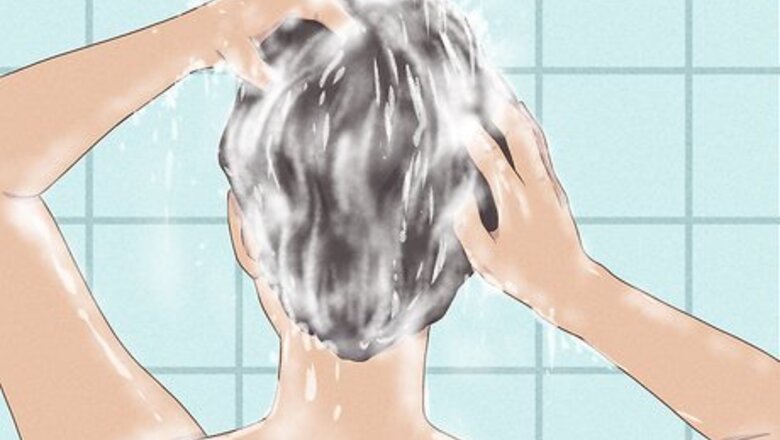
views
X
Research source
You will first need to section off the top portion of your hair. Then, slowly tape in the extension one by one. You will have to be careful while wearing the extensions, as they're very prone to tangling. Brush your hair more frequently and take extra time in the shower.
Sectioning Your Hair
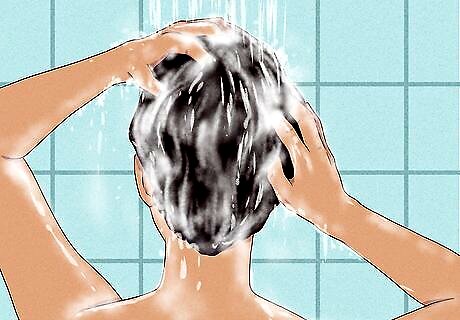
Wash your hair. Hair Stylist Madeline Johnson explains, "I don't suggest [applying tape-in extensions] on greasy hair. They should always be applied on clean hair and [with] no products in it." Before applying your extensions, wash and dry your hair as you normally would.
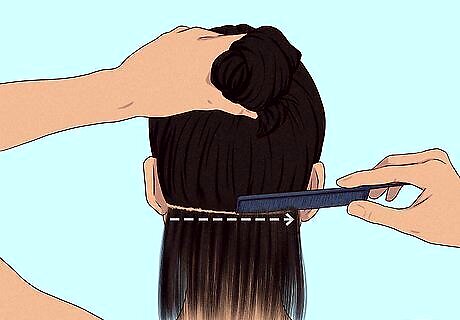
Make a part across your scalp. About an inch from the nape of your neck, use your finger or a comb to make a horizontal part. You will apply the extensions near the line made by the part. This way, your upper hair will hide the clips. Hair Stylist Madeline Johnson emphasizes the importance of parting your hair away from the hairline: "Never install tape-in extensions too close to your hairline. You always need to have enough hair in the front to cover the tape-in extensions."
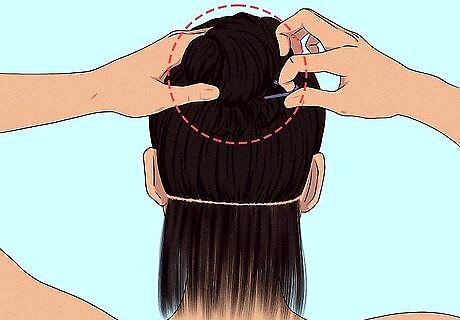
Section off the top hair. You can use a hair tie or hair clips to secure all the hair above the part line. Just make sure it's completely secured. You do not want any hair falling down and getting in the way while you're securing your extensions.
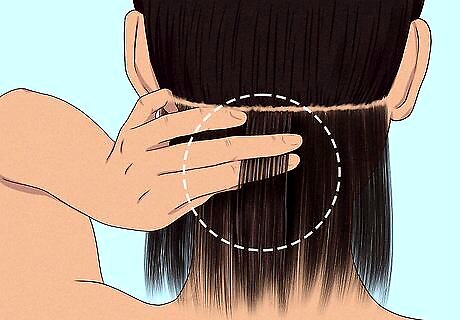
Remove a thin portion of your hair from the non-clipped part. The idea is to sandwich a thin strand of hair below your part line between top and bottom extensions. The strand of hair you're sandwiching needs to be very thin, about ⁄8 inch (0.32 cm). This is so the adhesive tape on both extensions can stick together through the hair. Grab a very thin strand of hair from the hair below your part line about the length of one extension. Make sure the hair is thin enough your fingers can feel one another through the hair.
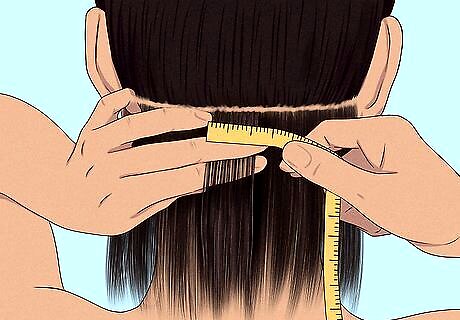
Measure the section. Before attaching the extension, use a cloth tape measurer to measure the section of hair that you parted. This way, you can determine how many pieces of the extension you'll need to add along that section of hair. Do this for every section.
Applying Your Extensions
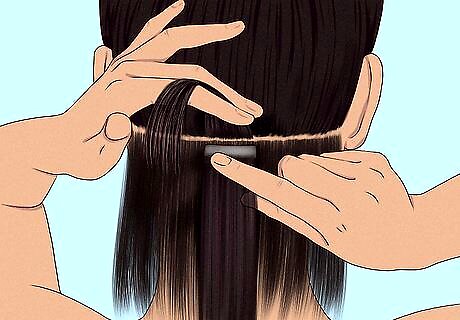
Attach the bottom extension under the thin portion of hair. Take your strand of hair and lift it up a little. Remove the strip covering the adhesive on the bottom extension. Press on the bottom extension underneath the thin strand of hair you're lifting.
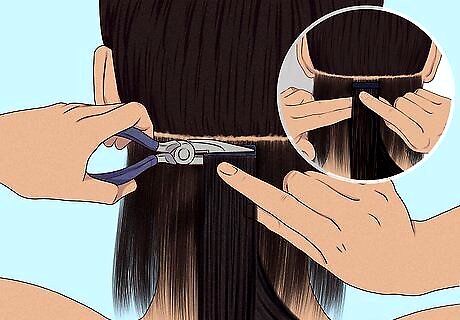
Secure the top extension. Take the top extension. After removing the adhesive tape covering that extension, press on top of your strand of hair. The top and bottom extension should stick together. Then press them together with pliers for a few seconds to secure them. If the extensions are not sticking, you used too much hair in your strand. Gently brush some hair off the bottom extension.
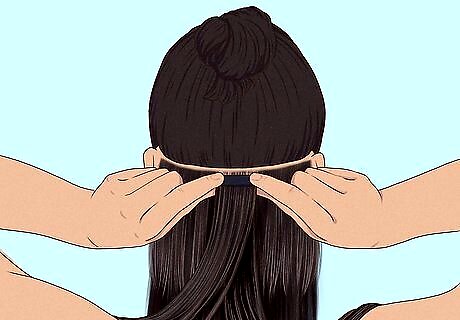
Repeat the process. Move across your side part, repeating this process until you have added all the extensions. The precise number of extensions you are adding depends on the size of your head. You will likely use about 5 rows of hair extensions or more, depending on how voluminous you want your hairstyle to be. If you plan to add extensions on the sides of your head, leave 1 inch (2.5 cm) of hair out horizontally, closest to the ear, and then continue applying the extensions. If you have a thin hairline, leave about 1 inch (2.5 cm) of hair out across your entire hairline before adding extensions, just to make sure that your hair has enough density to cover the tape-ins without making them noticeable.
Caring for Your Hair Afterwards
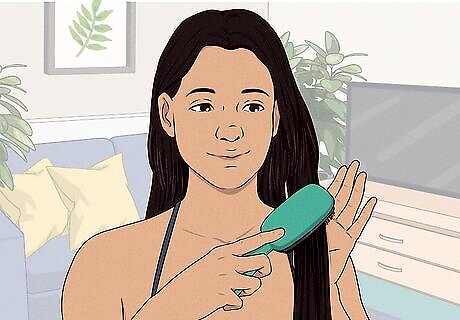
Take extra time for hair care. Hair Stylist Madeline Johnson explains, "I always advise my clients to put their hair into braids so the hair doesn't get tangled. [...] And definitely brush it daily." She goes on to say that extensions "create a lot of weight on your scalp and the hair [can get] tangled [more easily than your natural hair]." Make sure to account for having more hair in the morning. Give yourself an extra 10 to 15 minutes to get ready every day.
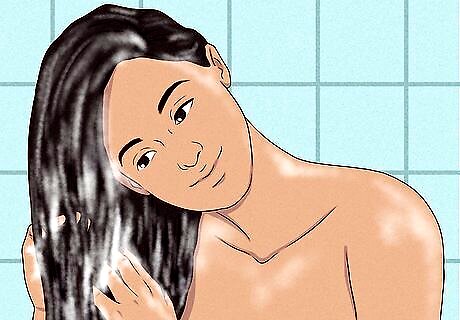
Wash your extensions thoroughly and carefully. Hair Stylist Madeline Johnson shares, "I put some shampoo on my fingertips and then I go through the [extension] rows with the shampoo. That way, I make sure I get the debris in between the rows too. I always use a conditioner after, mid-shaft to ends, and definitely don't [apply conditioner to the roots]." If you plan to spend time in the pool or in the ocean, Hair Stylist Madeline Johnson notes, "I advise my clients to take a shower first so that the hair gets absorbed with clean water, and use a conditioner on your hair to protect it from the chemicals in the water or the salt so the hair doesn't dry out fast or [get] discolored from the chlorine."
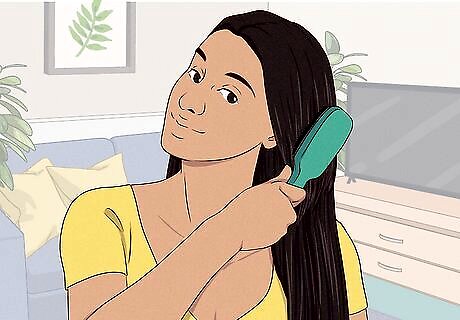
Brush your hair regularly. Extensions are prone to tangling. To keep your hair looking fresh and natural, brush your hair at least twice a day while your extensions are in place. Hair Stylist Madeline Johnson advises, "Take care of [the extensions] like it's your own hair." Remember, hair care may take extra time when you're wearing extensions. Synthetic extensions are more prone to tangling than human hair extensions.

Secure your hair overnight. As hair tangles easier, Hair Stylist Madeline Johnson recommends that you "put your hair into a ponytail or into braids." It can also help to sleep on silk pillows.As Hair Stylist Madeline Johnson explains, "the texture of silk is so soft and slippery that it doesn't grab onto your hair like other products can do. [...] It causes less breakage."




















Comments
0 comment